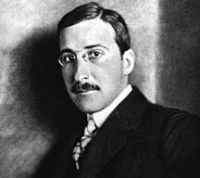
A suave baron takes a fancy to twelve-year-old Edgar's mother, while the three are holidaying in an Austrian mountain resort. His initial advances rejected, the baron befriends Edgar in order to get closer to the woman he desires. The initially unsuspecting child soon senses something is amiss, but has no idea of the …

José Fouché nació el 21 de mayo de 1759, en Le Pellerin, Francia. Hijo y descendiente de marineros y mercaderes, se esperaba que siguiera con la tradición de familia, pero las características físicas con las que Zweig describe al desvalido José, inducen

Letter from an Unknown Woman is a novella by Stefan Zweig. Published in 1922, it tells the story of an author who, while reading a letter written by a woman he does not remember, gets glimpses into her life story.

Confusion, also known under the literal translation Confusion of Feelings, and as Episode in the Early Life of Privy Councillor D. is a 1927 novella by the Austrian writer Stefan Zweig. It tells the story of a student and his friendship with a professor. It was originally published in the omnibus volume Conflicts: …

Life at the court of Louis XVI and Marie Antoinette has long captivated readers, drawn by accounts of the intrigues and pageantry that came to such a sudden and unexpected end. Stefan Zweig's Marie Antoinette: The Portrait of an Average Woman is a dramatic account of the guillotine's most famous victim, from the time …

Following the death of her husband, a middle-aged Englishwoman travels through Europe to escape loneliness and boredom. One evening during her stay at the French Riviera, while enjoying the atmosphere of the Monte Carlo Casino, she becomes mesmerized by the obsessive gambling of a young Polish aristocrat. This fateful …

The Post Office Girl is a novel by the Austrian writer Stefan Zweig. It tells the story of Christine Hoflehner, a female post-office clerk in poverty-stricken Vienna, Austria-Hungary, following World War I. The book was published posthumously in 1982.

The factors that change the course of history are primarily the product of the contributions made by individual lives to the broad pattern of mortal existence. In his collection of 'historical miniatures,' Stefan Zweig celebrates the monumental power of the spirit to discover, to create, to transcend the limits …

The World of Yesterday is the autobiography of Austrian writer Stefan Zweig. It is considered the most famous book on the Habsburg Empire. He started writing it in 1934 when, anticipating Anschluss and Nazi persecution, he uprooted himself from Austria to England and later to Brazil. He posted the manuscript, typed by …

 English
English Español
Español Deutsch
Deutsch
